- Home
- Anthony Trollope
The Last Chronicle of Barset Page 3
The Last Chronicle of Barset Read online
Page 3
CHAPTER I.
HOW DID HE GET IT?
"I can never bring myself to believe it, John," said Mary Walker,the pretty daughter of Mr. George Walker, attorney of Silverbridge.Walker and Winthrop was the name of the firm, and they wererespectable people, who did all the solicitors' business that hadto be done in that part of Barsetshire on behalf of the Crown, wereemployed on the local business of the Duke of Omnium who is great inthose parts, and altogether held their heads up high, as provinciallawyers often do. They,--the Walkers,--lived in a great brickhouse in the middle of the town, gave dinners, to which the countygentlemen not unfrequently condescended to come, and in a mild wayled the fashion in Silverbridge. "I can never bring myself to believeit, John," said Miss Walker.
"You'll have to bring yourself to believe it," said John, withouttaking his eyes from his book.
"A clergyman,--and such a clergyman too!"
"I don't see that that has anything to do with it." And as he nowspoke, John did take his eyes off his book. "Why should not aclergyman turn thief as well as anybody else? You girls always seemto forget that clergymen are only men after all."
"Their conduct is likely to be better than that of other men, Ithink."
"I deny it utterly," said John Walker. "I'll undertake to say thatat this moment there are more clergymen in debt in Barsetshire thanthere are either lawyers or doctors. This man has always been indebt. Since he has been in the county I don't think he has ever beenable to show his face in the High Street of Silverbridge."
"John, that is saying more than you have a right to say," said Mrs.Walker.
"Why, mother, this very cheque was given to a butcher who hadthreatened a few days before to post bills all about the county,giving an account of the debt that was due to him, if the money wasnot paid at once."
"More shame for Mr. Fletcher," said Mary. "He has made a fortune asbutcher in Silverbridge."
"What has that to do with it? Of course a man likes to have hismoney. He had written three times to the bishop, and he had senta man over to Hogglestock to get his little bill settled six daysrunning. You see he got it at last. Of course, a tradesman must lookfor his money."
"Mamma, do you think that Mr. Crawley stole the cheque?" Mary, as sheasked the question, came and stood over her mother, looking at herwith anxious eyes.
"I would rather give no opinion, my dear."
"But you must think something when everybody is talking about it,mamma."
"Of course my mother thinks he did," said John, going back to hisbook. "It is impossible that she should think otherwise."
"That is not fair, John," said Mrs. Walker; "and I won't have youfabricate thoughts for me, or put the expression of them into mymouth. The whole affair is very painful, and as your father isengaged in the inquiry, I think that the less said about the matterin this house the better. I am sure that that would be your father'sfeeling."
"Of course I should say nothing about it before him," said Mary. "Iknow that papa does not wish to have it talked about. But how is oneto help thinking about such a thing? It would be so terrible for allof us who belong to the Church."
"I do not see that at all," said John. "Mr. Crawley is not more thanany other man just because he's a clergyman. I hate all that kind ofclap-trap. There are a lot of people here in Silverbridge who thinkthe matter shouldn't be followed up, just because the man is in aposition which makes the crime more criminal in him than it would bein another."
"But I feel sure that Mr. Crawley has committed no crime at all,"said Mary.
"My dear," said Mrs. Walker, "I have just said that I would ratheryou would not talk about it. Papa will be in directly."
"I won't, mamma;--only--"
"Only! yes; just only!" said John. "She'd go on till dinner if anyone would stay to hear her."
"You've said twice as much as I have, John." But John had left theroom before his sister's last words could reach him.
"You know, mamma, it is quite impossible not to help thinking of it,"said Mary.
"I dare say it is, my dear."
"And when one knows the people it does make it so dreadful."
"But do you know them? I never spoke to Mr. Crawley in my life, andI do not think I ever saw her."
"I knew Grace very well,--when she used to come first to MissPrettyman's school."
"Poor girl. I pity her."
"Pity her! Pity is no word for it, mamma. My heart bleeds for them.And yet I do not believe for a moment that he stole the cheque. Howcan it be possible? For though he may have been in debt because theyhave been so very, very poor; yet we all know that he has been anexcellent clergyman. When the Robartses were dining here last, Iheard Mrs. Robarts say that for piety and devotion to his duties shehad hardly ever seen any one equal to him. And the Robartses knowmore of them than anybody."
"They say that the dean is his great friend."
"What a pity it is that the Arabins should be away just now when heis in such trouble." And in this way the mother and daughter wenton discussing the question of the clergyman's guilt in spite of Mrs.Walker's previously expressed desire that nothing more might be saidabout it. But Mrs. Walker, like many other mothers, was apt to bemore free in converse with her daughter than she was with her son.While they were thus talking the father came in from his office, andthen the subject was dropped. He was a man between fifty and sixtyyears of age, with grey hair, rather short, and somewhat corpulent,but still gifted with that amount of personal comeliness whichcomfortable position and the respect of others will generally seem togive. A man rarely carries himself meanly, whom the world holds highin esteem.
"I am very tired, my dear," said Mr. Walker.
"You look tired. Come and sit down for a few minutes before youdress. Mary, get your father's slippers." Mary instantly ran to thedoor.
"Thanks, my darling," said the father. And then he whispered to hiswife, as soon as Mary was out of hearing, "I fear that unfortunateman is guilty. I fear he is! I fear he is!"
"Oh, heavens! what will become of them?"
"What indeed? She has been with me to-day."
"Has she? And what could you say to her?"
"I told her at first that I could not see her, and begged her not tospeak to me about it. I tried to make her understand that she shouldgo to some one else. But it was of no use."
"And how did it end?"
"I asked her to go in to you, but she declined. She said you could donothing for her."
"And does she think her husband guilty?"
"No, indeed. She think him guilty! Nothing on earth,--or from heaveneither, as I take it, would make her suppose it to be possible. Shecame to me simply to tell me how good he was."
"I love her for that," said Mrs. Walker.
"So did I. But what is the good of loving her? Thank you, dearest.I'll get your slippers for you some day, perhaps."
The whole county was astir in this matter of this alleged guilt ofthe Reverend Josiah Crawley,--the whole county, almost as keenly asthe family of Mr. Walker, of Silverbridge. The crime laid to hischarge was the theft of a cheque for twenty pounds, which he was saidto have stolen out of a pocket-book left or dropped in his house, andto have passed as money into the hands of one Fletcher, a butcherof Silverbridge, to whom he was indebted. Mr. Crawley was in thosedays the perpetual curate of Hogglestock, a parish in the northernextremity of East Barsetshire; a man known by all who knew anythingof him to be very poor,--an unhappy, moody, disappointed man, uponwhom the troubles of the world always seemed to come with a doubleweight. But he had ever been respected as a clergyman, since hisold friend Mr. Arabin, the dean of Barchester, had given him thesmall incumbency which he now held. Though moody, unhappy, anddisappointed, he was a hard-working, conscientious pastor amongthe poor people with whom his lot was cast; for in the parish ofHogglestock there resided only a few farmers higher in degree thanfield labourers, brickmakers, and such like. Mr. Crawley had nowpassed some ten years of his life at Hogglestock; and during thoseyears he had worked v
ery hard to do his duty, struggling to teach thepeople around him perhaps too much of the mystery, but something alsoof the comfort, of religion. That he had become popular in his parishcannot be said of him. He was not a man to make himself popular inany position. I have said that he was moody and disappointed. He waseven worse than this; he was morose, sometimes almost to insanity.There had been days in which even his wife had found it impossibleto deal with him otherwise than as with an acknowledged lunatic. Andthis was known among the farmers, who talked about their clergymanamong themselves as though he were a madman. But among the very poor,among the brickmakers of Hoggle End,--a lawless, drunken, terriblyrough lot of humanity,--he was held in high respect; for they knewthat he lived hardly, as they lived; that he worked hard, as theyworked; and that the outside world was hard to him, as it was tothem; and there had been an apparent sincerity of godliness about theman, and a manifest struggle to do his duty in spite of the world'sill-usage, which had won its way even with the rough; so that Mr.Crawley's name had stood high with many in his parish, in spite ofthe unfortunate peculiarity of his disposition. This was the man whowas now accused of stealing a cheque for twenty pounds.
But before the circumstances of the alleged theft are stated, a wordor two must be said as to Mr. Crawley's family. It is declared that agood wife is a crown to her husband, but Mrs. Crawley had been muchmore than a crown to him. As had regarded all the inner life of theman,--all that portion of his life which had not been passed in thepulpit or in pastoral teaching,--she had been crown, throne, andsceptre all in one. That she had endured with him and on his behalfthe miseries of poverty, and the troubles of a life which had knownno smiles, is perhaps not to be alleged as much to her honour.She had joined herself to him for better or worse, and it was hermanifest duty to bear such things; wives always have to bear them,knowing when they marry that they must take their chance. Mr. Crawleymight have been a bishop, and Mrs. Crawley, when she married him,perhaps thought it probable that such would be his fortune. Insteadof that he was now, just as he was approaching his fiftieth year, aperpetual curate, with an income of one hundred and thirty poundsper annum,--and a family. That had been Mrs. Crawley's luck in life,and of course she bore it. But she had also done much more thanthis. She had striven hard to be contented, or, rather, to appearto be contented, when he had been most wretched and most moody.She had struggled to conceal from him her own conviction as to hishalf-insanity, treating him at the same time with the respect dueto an honoured father of a family, and with the careful measuredindulgence fit for a sick and wayward child. In all the terribletroubles of their life her courage had been higher than his. Themetal of which she was made had been tempered to a steel which wasvery rare and fine, but the rareness and fineness of which he hadfailed to appreciate. He had often told her that she was withoutpride, because she had stooped to receive from others, on his behalfand on behalf of her children, things which were very needful, butwhich she could not buy. He had told her that she was a beggar, andthat it was better to starve than to beg. She had borne the rebukewithout a word in reply, and had then begged again for him, and hadendured the starvation herself. Nothing in their poverty had, foryears past, been a shame to her; but every accident of their povertywas still, and ever had been, a living disgrace to him.
Mr. and Mrs. Crawley.]
They had had many children, and three were still alive. Of theeldest, Grace Crawley, we shall hear much in the coming story. Shewas at this time nineteen years old, and there were those who saidthat, in spite of her poverty, her shabby outward apparel, and acertain thin, unfledged, unrounded form of person, a want of fulnessin the lines of her figure, she was the prettiest girl in that partof the world. She was living now at a school in Silverbridge, wherefor the last year she had been a teacher; and there were many inSilverbridge who declared that very bright prospects were opening toher,--that young Major Grantly of Cosby Lodge, who, though a widowerwith a young child, was the cynosure of all female eyes in andround Silverbridge, had found beauty in her thin face, and thatGrace Crawley's fortune was made in the teeth, as it were, of theprevailing ill-fortune of her family. Bob Crawley, who was two yearsyounger, was now at Marlbro' School, from whence it was intended thathe should proceed to Cambridge, and be educated there at the expenseof his godfather, Dean Arabin. In this also the world saw a strokeof good luck. But then nothing was lucky to Mr. Crawley. Bob, indeed,who had done very well at school, might do well at Cambridge,--mightdo great things there. But Mr. Crawley would almost have preferredthat the boy should work in the fields, than that he should beeducated in a manner so manifestly eleemosynary. And then hisclothes! How was he to be provided with clothes fit either for schoolor for college? But the dean and Mrs. Crawley between them managedthis, leaving Mr. Crawley very much in the dark, as Mrs. Crawley wasin the habit of leaving him. Then there was a younger daughter, Jane,still at home, who passed her life between her mother's work-tableand her father's Greek, mending linen and learning to scaniambics,--for Mr. Crawley in his early days had been a ripe scholar.
And now there had come upon them all this terribly-crushing disaster.That poor Mr. Crawley had gradually got himself into a mess of debtat Silverbridge, from which he was quite unable to extricate himself,was generally known by all the world both of Silverbridge andHogglestock. To a great many it was known that Dean Arabin hadpaid money for him, very much contrary to his own consent, andthat he had quarrelled, or attempted to quarrel, with the dean inconsequence,--had so attempted, although the money had in part passedthrough his own hands. There had been one creditor, Fletcher, thebutcher of Silverbridge, who had of late been specially hard uponpoor Crawley. This man, who had not been without good nature in hisdealings, had heard stories of the dean's good-will and such like,and had loudly expressed his opinion that the perpetual curate ofHogglestock would show a higher pride in allowing himself to beindebted to a rich brother clergyman, than in remaining under thrallto a butcher. And thus a rumour had grown up. And then the butcherhad written repeated letters to the bishop,--to Bishop Proudie ofBarchester, who had at first caused his chaplain to answer them,and had told Mr. Crawley somewhat roundly what was his opinion of aclergyman who eat meat and did not pay for it. But nothing that thebishop could say or do enabled Mr. Crawley to pay the butcher. It wasvery grievous to such a man as Mr. Crawley to receive these lettersfrom such a man as Bishop Proudie; but the letters came, and madefestering wounds, but then there was an end of them. And at lastthere had come forth from the butcher's shop a threat that if themoney were not paid by a certain date, printed bills should be postedabout the county. All who heard of this in Silverbridge were veryangry with Mr. Fletcher, for no one there had ever known a tradesmanto take such a step before; but Fletcher swore that he wouldpersevere, and defended himself by showing that six or seven monthssince, in the spring of the year, Mr. Crawley had been paying moneyin Silverbridge, but had paid none to him,--to him who had been notonly his earliest, but his most enduring creditor. "He got moneyfrom the dean in March," said Mr. Fletcher to Mr. Walker, "and hepaid twelve pounds ten to Green, and seventeen pounds to Grobury,the baker." It was that seventeen pounds to Grobury, the baker, forflour, which made the butcher so fixedly determined to smite thepoor clergyman hip and thigh. "And he paid money to Hall, and to Mrs.Holt, and to a deal more; but he never came near my shop. If he hadeven shown himself, I would not have said so much about it." And thena day before the date named, Mrs. Crawley had come to Silverbridge,and had paid the butcher twenty pounds in four five-pound notes. Sofar Fletcher the butcher had been successful.
Some six weeks after this, inquiry began to be made as to a certaincheque for twenty pounds drawn by Lord Lufton on his bankers inLondon, which cheque had been lost early in the spring by Mr. Soames,Lord Lufton's man of business in Barsetshire, together with apocket-book in which it had been folded. This pocket-book Soames hadbelieved himself to have left at Mr. Crawley's house, and had goneso far, even at the time of the loss, as to express his absoluteconviction that he had so l
eft it. He was in the habit of paying arentcharge to Mr. Crawley on behalf of Lord Lufton, amounting totwenty pounds four shillings, every half-year. Lord Lufton heldthe large tithes of Hogglestock, and paid annually a sum of fortypounds eight shillings to the incumbent. This amount was, as a rule,remitted punctually by Mr. Soames through the post. On the occasionnow spoken of, he had had some reason for visiting Hogglestock, andhad paid the money personally to Mr. Crawley. Of so much there wasno doubt. But he had paid it by a cheque drawn by himself on hisown bankers at Barchester, and that cheque had been cashed in theordinary way on the next morning. On returning to his own house inBarchester he had missed his pocket-book, and had written to Mr.Crawley to make inquiry. There had been no money in it, beyond thecheque drawn by Lord Lufton for twenty pounds. Mr. Crawley hadanswered this letter by another, saying that no pocket-book had beenfound in his house. All this had happened in March.
In October, Mrs. Crawley paid the twenty pounds to Fletcher, thebutcher, and in November Lord Lufton's cheque was traced back throughthe Barchester bank to Mr. Crawley's hands. A brickmaker of HoggleEnd, much favoured by Mr. Crawley, had asked for change over thecounter of this Barchester bank,--not, as will be understood,the bank on which the cheque was drawn--and had received it. Theaccommodation had been refused to the man at first, but when hepresented the cheque the second day, bearing Mr. Crawley's name onthe back of it, together with a note from Mr. Crawley himself, themoney had been given for it; and the identical notes so paid had beengiven to Fletcher, the butcher, on the next day by Mrs. Crawley. Wheninquiry was made, Mr. Crawley stated that the cheque had been paidto him by Mr. Soames, on behalf of the rentcharge due to him by LordLufton. But the error of this statement was at once made manifest.There was the cheque, signed by Mr. Soames himself, for the exactamount,--twenty pounds four shillings. As he himself declared, he hadnever in his life paid money on behalf of Lord Lufton by a chequedrawn by his lordship. The cheque given by Lord Lufton, and which hadbeen lost, had been a private matter between them. His lordship hadsimply wanted change in his pocket, and his agent had given it tohim. Mr. Crawley was speedily shown to be altogether wrong in thestatement made to account for possession of the cheque.
Then he became very moody and would say nothing further. But hiswife, who had known nothing of his first statement when made, cameforward and declared that she believed the cheque for twenty poundsto be a part of a present given by Dean Arabin to her husband inApril last. There had been, she said, great heartburnings aboutthis gift, and she had hardly dared to speak to her husband on thesubject. An execution had been threatened in the house by Grobury,the baker, of which the dean had heard. Then there had been somescenes at the deanery between her husband and the dean and Mrs.Arabin, as to which she had subsequently heard much from Mrs. Arabin.Mrs. Arabin had told her that money had been given,--and at lasttaken. Indeed, so much had been very apparent, as bills had been paidto the amount of at least fifty pounds. When the threat made by thebutcher had reached her husband's ears, the effect upon him had beenvery grievous. All this was the story told by Mrs. Crawley to Mr.Walker, the lawyer, when he was pushing his inquiries. She, poorwoman, at any rate told all that she knew. Her husband had told herone morning, when the butcher's threat was weighing heavily on hismind, speaking to her in such a humour that she found it impossibleto cross-question him, that he had still money left, though it wasmoney which he had hoped that he would not be driven to use; and hehad given her the four five-pound notes, and had told her to go toSilverbridge and satisfy the man who was so eager for his money. Shehad done so, and had felt no doubt that the money so forthcoming hadbeen given by the dean. That was the story as told by Mrs. Crawley.
But how could she explain her husband's statement as to the cheque,which had been shown to be altogether false? All this passed betweenMr. Walker and Mrs. Crawley, and the lawyer was very gentle with her.In the first stages of the inquiry he had simply desired to learn thetruth, and place the clergyman above suspicion. Latterly, being boundas he was to follow the matter up officially, he would not have seenMrs. Crawley, had he been able to escape that lady's importunity."Mr. Walker," she had said, at last, "you do not know my husband.No one knows him but I. It is hard to have to tell you of all ourtroubles." "If I can lessen them, trust me that I will do so," saidthe lawyer. "No one, I think, can lessen them in this world," saidthe lady. "The truth is, sir, that my husband often knows not whathe says. When he declared that the money had been paid to him by Mr.Soames, most certainly he thought so. There are times when in hismisery he knows not what he says,--when he forgets everything."
Up to this period Mr. Walker had not suspected Mr. Crawley ofanything dishonest, nor did he suspect him as yet. The poor man hadprobably received the money from the dean, and had told the lie aboutit, not choosing to own that he had taken money from his rich friend,and thinking that there would be no further inquiry. He had been veryfoolish, and that would be the end of it. Mr. Soames was by no meansso good-natured in his belief. "How should my pocket-book have gotinto Dean Arabin's hands?" said Mr. Soames, almost triumphantly. "Andthen I felt sure at the time that I had left it at Crawley's house!"
Mr. Walker wrote a letter to the dean, who at that moment was inFlorence, on his way to Rome, from whence he was going on to the HolyLand. There came back a letter from Mr. Arabin, saying that on the17th of March he had given to Mr. Crawley a sum of fifty pounds, andthat the payment had been made with five Bank of England notes often pounds each, which had been handed by him to his friend in thelibrary at the deanery. The letter was very short, and may, perhaps,be described as having been almost curt. Mr. Walker, in his anxietyto do the best he could for Mr. Crawley, had simply asked a questionas to the nature of the transaction between the two gentlemen, sayingthat no doubt the dean's answer would clear up a little mystery whichexisted at present respecting a cheque for twenty pounds. The deanin answer simply stated the fact as it has been given above; buthe wrote to Mr. Crawley begging to know what was in truth this newdifficulty, and offering any assistance in his power. He explainedall the circumstances of the money, as he remembered them. The sumadvanced had certainly consisted of fifty pounds, and there hadcertainly been five Bank of England notes. He had put the notesinto an envelope, which he had not closed, but had addressed to Mr.Crawley, and had placed this envelope in his friend's hands. He wenton to say that Mrs. Arabin would have written, but that she was inParis with her son. Mrs. Arabin was to remain in Paris during hisabsence in the Holy Land, and meet him in Italy on his return. Asshe was so much nearer at hand, the dean expressed a hope that Mrs.Crawley would apply to her if there was any trouble.
The letter to Mr. Walker was conclusive as to the dean's money. Mr.Crawley had not received Lord Lufton's cheque from the dean. Thenwhence had he received it? The poor wife was left by the lawyer toobtain further information from her husband. Ah, who can tell howterrible were the scenes between that poor pair of wretches, as thewife endeavoured to learn the truth from her miserable, half-maddenedhusband! That her husband had been honest throughout, she had notany shadow of doubt. She did not doubt that to her at least heendeavoured to tell the truth, as far as his poor racked imperfectmemory would allow him to remember what was true and what was nottrue. The upshot of it all was that the husband declared that hestill believed that the money had come to him from the dean. He hadkept it by him, not wishing to use it if he could help it. He hadforgotten it,--so he said at times,--having understood from Arabinthat he was to have fifty pounds, and having received more. If it hadnot come to him from the dean, then it had been sent to him by thePrince of Evil for his utter undoing; and there were times in whichhe seemed to think that such had been the manner in which the fatalcheque had reached him. In all that he said he was terribly confused,contradictory, unintelligible,--speaking almost as a madman mightspeak,--ending always by declaring that the cruelty of the world hadbeen too much for him, that the waters were meeting over his head,and praying for God's mercy to remove him from the world. It needhardly be sai
d that his poor wife in these days had a burden on hershoulders that was more than enough to crush any woman.
She at last acknowledged to Mr. Walker that she could not accountfor the twenty pounds. She herself would write again to the deanabout it, but she hardly hoped for any further assistance there. "Thedean's answer is very plain," said Mr. Walker. "He says that he gaveMr. Crawley five ten-pound notes, and those five notes we have tracedto Mr. Crawley's hands." Then Mrs. Crawley could say nothing furtherbeyond making protestations of her husband's innocence.

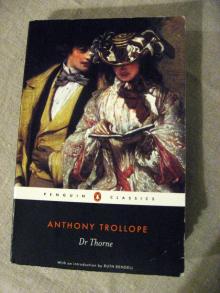 Doctor Thorne
Doctor Thorne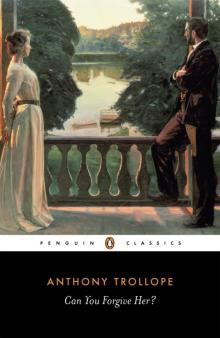 Can You Forgive Her?
Can You Forgive Her?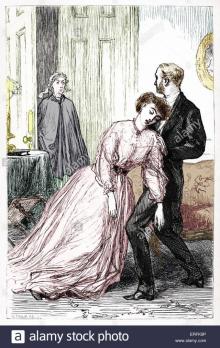 The Last Chronicle of Barset
The Last Chronicle of Barset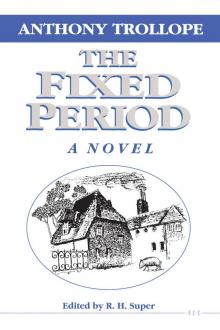 The Fixed Period
The Fixed Period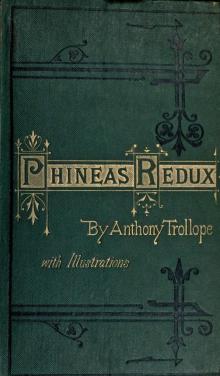 Phineas Redux
Phineas Redux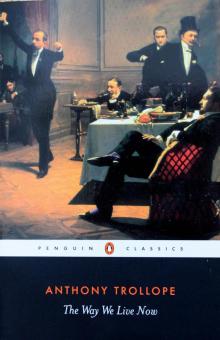 The Way We Live Now
The Way We Live Now Castle Richmond
Castle Richmond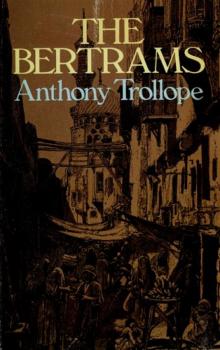 The Bertrams
The Bertrams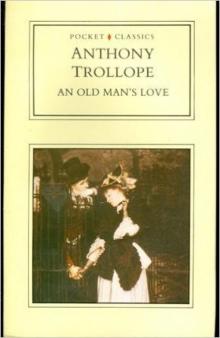 An Old Man's Love
An Old Man's Love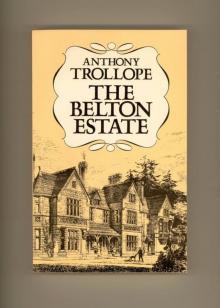 The Belton Estate
The Belton Estate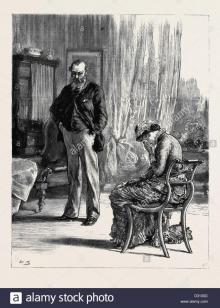 Marion Fay: A Novel
Marion Fay: A Novel The Claverings
The Claverings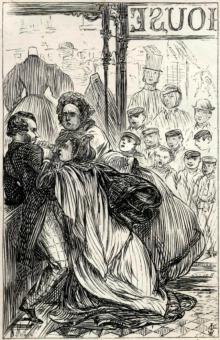 The Struggles of Brown, Jones, and Robinson
The Struggles of Brown, Jones, and Robinson Nina Balatka
Nina Balatka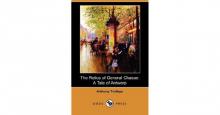 The Relics of General Chasse: A Tale of Antwerp
The Relics of General Chasse: A Tale of Antwerp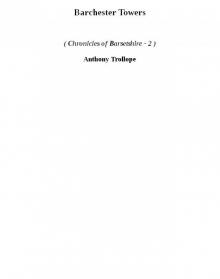 Barchester Towers cob-2
Barchester Towers cob-2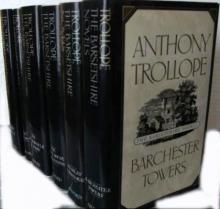 The Chronicles of Barsetshire
The Chronicles of Barsetshire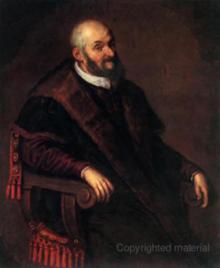 The Warden cob-1
The Warden cob-1 Framley Parsonage
Framley Parsonage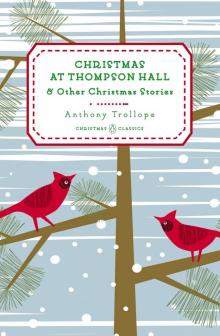 Christmas at Thompson Hall
Christmas at Thompson Hall The Warden
The Warden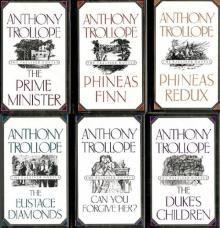 The Palliser Novels
The Palliser Novels The Small House at Allington
The Small House at Allington Barchester Towers
Barchester Towers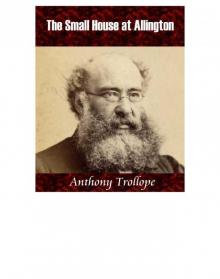 The Small House at Allington cob-5
The Small House at Allington cob-5 The Duke's Children
The Duke's Children Phineas Finn, the Irish Member
Phineas Finn, the Irish Member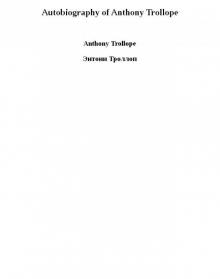 Autobiography of Anthony Trollope
Autobiography of Anthony Trollope